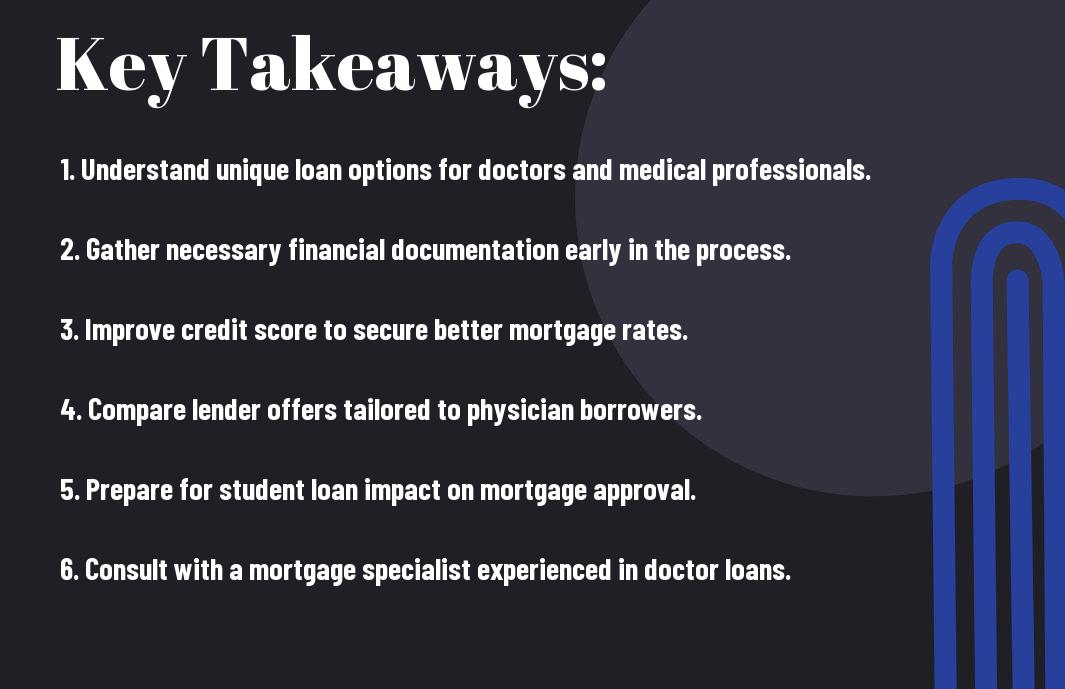It’s important to understand the specific challenges and opportunities that come with securing a mortgage as a first-time homebuyer, particularly for those in the medical field. You may find that traditional loan processes don’t fit your unique financial situation, which is often characterized by student debt and fluctuating income. This post will walk you through the intricacies of the doctor mortgage loan process, offering practical tips to help you confidently navigate your way to homeownership.
Unlocking the Doctor Mortgage Advantage
Doctor mortgage loans provide tailored financing solutions for medical professionals, offering unique benefits that cater specifically to your needs. Whether you’re a resident, fellow, or established physician, these loans recognize your earning potential and alleviate some of the common financial barriers to homeownership. Utilizing these advantages can help make your path to owning a home smoother and more accessible.
Special Benefits Tailored for Medical Professionals
These loans often come with reduced down payment requirements, sometimes as low as 0% to 5%, which can significantly decrease your upfront costs. Additionally, some programs allow for higher loan amounts without the need for private mortgage insurance (PMI), which can save you money over time. Overall, these benefits are explicitly designed to accommodate your unique financial situation as a medical professional.
Comparing Doctor Mortgages to Conventional Loans
While conventional loans typically follow standard requirements, doctor mortgages are designed to accommodate the unique circumstances of medical professionals. This can include consideration of future income levels, student loan debt management, and even flexible credit score guidelines. The ability to secure financing tailored to your profession enables you to put your energy toward your medical career rather than financial hurdles.
Comparison of Loan Features
| Feature | Doctor Mortgage |
|---|---|
| Down Payment | As low as 0%-5% |
| Private Mortgage Insurance (PMI) | No PMI on certain loans |
| Debt-to-Income Ratio | Flexible, considers future earnings |
| Loan Limits | Higher limits for medical professionals |
In contrast, conventional mortgages often require a 20% down payment and expect a less flexible approach towards debt-to-income ratios. While they can be suitable for borrowers outside of the medical field, you may find their terms less accommodating due to your student loan debt, which is a common concern for many in the medical profession. By leveraging a doctor mortgage, you maximize your home-buying potential while minimizing upfront financial strain.
Further Differences in Loan Terms
| Term | Conventional Loan |
|---|---|
| Loan Process Duration | Standard timeframes apply |
| Pre-Approval Process | Stringent documentation needed |
| Flexibility in Qualification | Less flexible |

Demystifying the Application Process
Understanding the application process for a doctor mortgage loan can relieve much of the anxiety associated with homebuying. As a first-time buyer, you’ll navigate through various stages, from pre-approval to finalizing your loan, each step contributing to a clearer picture of your financial capabilities. The lender will assess your income, creditworthiness, and overall financial health to determine your eligibility, enabling you to confidently enter the market for your new home.
Essential Documentation Required for Approval
Your lender will request specific documentation to verify your financial situation and support your application. Common documents include your tax returns, bank statements, proof of employment, and recent pay stubs. Having all these materials organized and readily available can expedite the approval process, ensuring that you’re prepared to move quickly when you find the right property.
Common Pitfalls and How to Avoid Them
Several common pitfalls can derail your mortgage application. Oversights in documentation, underestimating debt-to-income ratios, and ignoring potential credit score impacts can all inhibit your loan approval. Address these issues proactively by carefully reviewing your finances and consulting with your lender to clarify expectations before submitting your application.
When tackling common pitfalls, focus on your credit report to avoid surprises that may affect your approval. Review your report for errors, as even minor discrepancies can lead to higher interest rates or denial of your mortgage. Keep your debt-to-income ratio in check by managing existing debts while applying for a new mortgage. Lastly, steer clear of making large purchases or opening new credit accounts during the application process, as these actions can adversely impact your credit score and borrowing power. Taking these precautionary measures will help streamline your application experience and improve your chances of securing the loan you need.
Calculating Your Financial Readiness
Evaluating your financial readiness involves analyzing multiple factors that impact your ability to secure a doctor mortgage loan. Begin by examining your income, expenses, savings, and any outstanding debts. Assemble your financial records in one place to get a clearer picture of your situation, ensuring you’re prepared for the loan application process and can make well-informed decisions about your budget and future home purchase.
Assessing Debt-to-Income Ratios
Your debt-to-income (DTI) ratio is a vital indicator used by lenders to assess your financial health. This number represents the percentage of your monthly income that goes toward debt payments, including student loans, credit cards, and any other obligations. Ideally, you should aim for a DTI of 43% or lower to improve your chances of loan approval. Lenders typically favor lower ratios, as they indicate you have more disposable income available for your mortgage payments.
The Importance of Credit Scores in Securing a Loan
Credit scores serve as a critical factor in the loan approval process, directly influencing the interest rates you receive and the types of financing available to you. Lenders often favor applicants with scores of 740 and above, as these scores signify responsible credit use and low risk. If your score is below this threshold, consider taking steps to improve it, such as paying off outstanding debt, ensuring timely payments, and keeping credit utilization low. A stronger credit score can result in thousands of dollars in savings over the life of your mortgage, making it worthwhile to prioritize this aspect of your financial health.
Making Informed Decisions: Choosing the Right Lender
Selecting the right lender can significantly influence your homebuying experience. With various options available, investigate banks, credit unions, and specialized mortgage lenders to find one that aligns with your financial goals. Look for lenders who understand the unique challenges that medical professionals face, such as student loan debt and fluctuating income, as they can offer tailored solutions that better suit your needs.
Key Questions to Ask Potential Lenders
Before committing, ask potential lenders about their experience with doctor mortgage loans, the types of loan products they offer, and their process for pre-approval. Inquire about their turn-around times, fees, and whether they provide personalized assistance throughout the process. These inquiries will help clarify which lender can best meet your needs.
Evaluating Loan Terms and Conditions
Your evaluation of loan terms and conditions should extend beyond interest rates. Consider the loan duration, principal, private mortgage insurance (PMI), and possible prepayment penalties. Understanding these elements helps ensure you pick a loan that not only meets your immediate financial needs but is also manageable in the long run.
Focus on the specifics of the terms each lender provides. For instance, while one lender may offer a lower interest rate, they might also impose higher closing costs or a shorter repayment period, potentially increasing your monthly payments. Ensure you analyze the total cost of the loan over its lifetime, including any fees, so you can make an informed decision that supports both your current financial situation and future stability. Axios engage in thorough discussions about other aspects of the loan, such as flexible repayment options or down payment requirements, which may significantly further impact your homebuying journey.
Preparing for a Seamless Closing Process
As closing day approaches, having all your documentation in order will make the process much smoother. This includes your loan agreement, identification, proof of homeowners insurance, and any required closing disclosures. Confirm that you have sufficient funds for closing costs and are aware of the payment methods accepted by your lender. Staying organized will help take the stress out of this final step.
What to Expect on Closing Day
On closing day, you’ll sit down with your lender, the seller, and possibly a real estate agent to finalize the transaction. You’ll review and sign a stack of documents, including the loan agreement and deed. It’s normal to feel overwhelmed, but take your time to read everything and ask questions. Once completed, you’ll receive the keys to your new home and can officially move in.
Final Steps to Ensure a Smooth Transition
After signing all necessary documents, there are a few final steps to keep in mind. Make sure that any closing costs are paid, utilities are transferred to your name, and you have a move-in plan. Don’t overlook scheduling a walk-through of the property to ensure everything is as agreed. Double-check maintenance contacts for the first few weeks as well as confirm your moving day logistics to ensure everything goes off without a hitch.
Taking proactive steps is important for a seamless transition into your new home. Engage with your seller a couple of days before the closing to confirm that any repairs or concessions have been made as promised. Arrange for utilities to be active by your move-in date to avoid disruption. Lastly, create a detailed moving checklist to streamline tasks. By focusing on these aspects, you’ll set yourself up for a smoother homeownership experience right from the start.
Conclusion
With these considerations in mind, you can confidently navigate the doctor mortgage loan process as a first-time homebuyer. Understanding your unique financial situation and the options available will empower you to make informed decisions. Take the time to research lenders, gather necessary documents, and ask questions to ensure you secure the best terms for your loan. Ultimately, being well-prepared will help you achieve homeownership successfully and set a solid foundation for your future.




